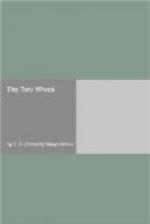“It’s hardly worth while to go home now,” said he, as he closed his cash and bill books, after making some required entries therein. “Mary has given me over long ago. And, besides, I don’t feel in the mood of mind to see her just now. I can’t look cheerful, to save me; and I have already called too many shadows to her face to darken it with any more. By evening I will recover myself, and then can meet her with a brighter countenance. No, I won’t go home now. I’ll stop around to Elder’s, and get a cut of roast beef.”
Wilkinson had taken up his hat, and was moving down the store, when a suggestion that came to his mind made him pause. It was this:
“But is not Mary waiting for me, and will not my absence for the whole day cause her intense anxiety and alarm? I ought to go home.”
And now began an argument in his thoughts. The fact was, a sense of exhaustion of body and depression of spirits had followed the effort and trouble of the day, and Wilkinson felt a much stronger desire for something stimulating to drink than he did for food. Elder’s was a drinking as well as an eating-house; and in deciding to go there, instead of returning home, the real influence, although he did not perceive it to be so, was the craving felt for a glass of brandy. And now came the conflict between appetite and an instinctive sense of what was due both to himself and his wife.
“It will only put her to trouble if I go home now.” Thus he sought to justify himself in doing what his better sense clearly condemned as wrong.
“It will rather relieve her from trouble,” was quickly answered to this.
For a little while Wilkinson stood undecided, then slowly retired to a remote part of the store, took off his hat, and sat down to debate the point at issue in his mind more coolly.
“I will go home early,” said he to himself.
“Why not go home now?” was instantly replied.
“It is too late; Mary has given me up long ago.”
“She will be extremely anxious.”
“I can explain all.”
“Better do it now than two or three hours later: poor Mary has suffered enough already.”
This last suggestion caused the image of his wife to come up before the mind of Wilkinson very distinctly. He saw, now, her smile of winning love; now, the sad drooping of her countenance, as he turned to leave her alone for an evening; now, the glance of anxiety and fear with which she so often greeted his return; and now, her pale, grief-stricken face, after some one of his too many lapses from the right way. And, in imagination, his thoughts went to his home in the present moment. What did he see? A waiting, anxious, troubled wife, now sitting with fixed and dreamy eyes; now moving about with restless steps; and now standing at the street-door, eagerly straining her eyes to see in the distance his approaching form. With such images of his wife came no repulsive




